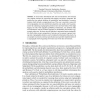Free Online Productivity Tools
i2Speak
i2Symbol
i2OCR
iTex2Img
iWeb2Print
iWeb2Shot
i2Type
iPdf2Split
iPdf2Merge
i2Bopomofo
i2Arabic
i2Style
i2Image
i2PDF
iLatex2Rtf
Sci2ools
101
click to vote
SP
1990
IEEE
1990
IEEE
Probabilistic Interference
In recent times information flow and non-interference have become very popular concepts for expressing both integrity and privacy properties. We present the first general definition of probabilistic non-interference in reactive systems which includes a computational case. This case is essential to cope with real cryptography since non-interference properties can usually only be guaranteed if the underlying cryptographic primitives have not been broken. This might happen, but only with negligible probability. Furthermore, our definition links non-interference with the common approach of simulatability that modern cryptography often uses. We show that our definition is maintained under simulatability, which allows secure composition of systems, and we present a general strategy how cryptographic primitives can be included in information flow proofs. As le we present an abstract specification and a possible implementation of a cryptographic firewall guarding two honest users from their en...
Related Content
| Added | 11 Aug 2010 |
| Updated | 11 Aug 2010 |
| Type | Conference |
| Year | 1990 |
| Where | SP |
| Authors | James W. Gray III |
Comments (0)

